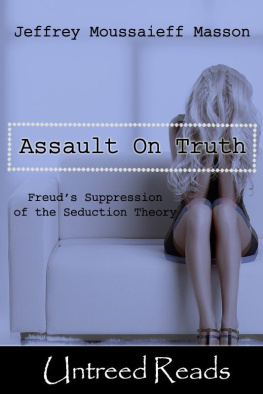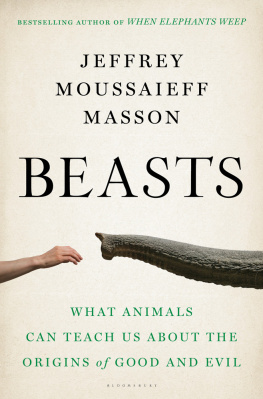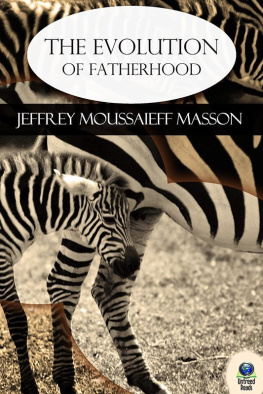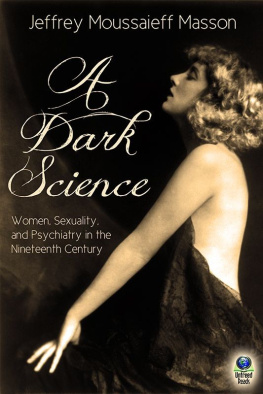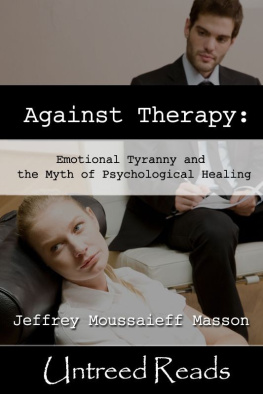Table of Contents
Against Therapy
By Jeffrey Moussaieff Masson
Copyright 2012 by Jeffrey Moussaieff Masson
Cover Copyright 2012 by Ginny Glass and Untreed Reads Publishing
The author is hereby established as the sole holder of the copyright. Either the publisher (Untreed Reads) or author may enforce copyrights to the fullest extent.
Previously published in print, 1988, 1994 .
This ebook is licensed for your personal enjoyment only. This ebook may not be resold, reproduced or transmitted by any means in any form or given away to other people without specific permission from the author and/or publisher. If you would like to share this book with another person, please purchase an additional copy for each person you share it with. If youre reading this book and did not purchase it, or it was not purchased for your use only, then please return to your ebook retailer and purchase your own copy. Thank you for respecting the hard work of this author.
http://www.untreedreads.com
Against Therapy
Jeffrey Moussaieff Masson
FOREWORD
Jeffrey Masson is a trouble maker. Every one of his books has been written to create trouble.
Masson was a Sanskrit scholar before becoming a psychoanalyst, and his first book, The Oceanic Feeling: The Origins of Religious Sentiment in Ancient India, set out to show that there are no gurus, that is, people so perceptive and wise that they can be trusted totally and implicitly. As Projects Director of the Freud Archives he edited and translated The Complete Letters of Sigmund Freud to Wilhelm Fliess, 1887 1904 (not actually published until after his next book). The work he did on this correspondence laid the basis for his attack on Freud and the cornerstone of psychoanalytic theory, the Oedipal complex. In his second book, The Assault on Truth: Freuds Suppression of the Seduction Theory, he launched this attack, aiming to show that Freud, unable to confront any longer the real and terrible traumas which his clients as children had suffered, came to regard their stories as fantasies motivated by childish sexual desires. Although at the same time as Masson the psychoanalyst Alice Miller was writing about how the real sufferings of children affected them for life, and a host of women were speaking and writing about their experiences of incest, the psychoanalytic community rejected Masson and his work totally. After all, if you pull the cornerstone out, the whole building might come tumbling down.
A traitor to his profession, Masson now became a traitor to his sex. His next book, A Dark Science: Women, Sexuality and Psychiatry in the Nineteenth Century , took the side of women against the men who claimed to help them and from whose work came the medical model of mental illness and psychiatry as we know it today. Not content with that, Masson has now moved on to attack the whole philosophy and practice of psychotherapy.
Psychotherapy, like television and credit cards, is big business in the USA. British people who comment scathingly on the way each American is supposed to consult a psychoanalyst daily may not realize that psychotherapy is big business here in the UK. This is not so much in the private sector of health care, though the number of psychotherapists in private practice is burgeoning, but in the National Health Service and amongst voluntary mental health care organizations. Psychiatrists do psychotherapy, so do psychologists, nurses, social workers and occupational therapists. If people feel that psychotherapy is too pretentious a word to apply to what they do, they describe what they do as counselling, and so we have student counsellors, marriage guidance counsellors, Samaritan counsellors, co-counsellors, bereavement counsellors, alcohol counsellors, drug counsellors, tranquillizer counsellors, clergy counsellors, policewomen counsellors, counsellors at day centres and drop-in centres, counsellors on radio and television. More recently, many of these psychotherapists and counsellors have turned into experts. Though sexual abuse of children has only recently come to be seen as a prevalent and serious problem, there are now dozens of counsellors and psychotherapists who are experts on sexual abuse, just as there are counsellors and psychotherapists who are experts on disasters like the sinking of the P & O car ferry off Zeebrugge and the underground fire at Kings Cross Station. Indeed, there are so many counsellors and psychotherapists that I sometimes wonder if we are going to run out of people who want to be counselled. That would never do, for I am one of the people in the psychotherapy/counselling business.
There was not always a plethora of psychotherapists. When I first came to England from Australia in 1968 I went to work at a university psychiatric clinic where the professor and the other consultant psychiatrists were devotees of the medical model of mental illness. Freud was discussed only to be dismissed as unscientific and implausible. There the psychologists role was to administer tests, the psychiatrists role to diagnose mental illness, prescribe drugs, and to supervise the administration of ECT (electro-convulsive therapy) and the occasional pre-frontal lobotomy (making some incisions in a patients brain).
All this came as a surprise to me. Back in Sydney, Freud and psychoanalysis occupied a major part of the training of clinical psychologists and of some psychiatrists, particularly child psychiatrists. Amongst my colleagues in Sydney there was general agreement that people found it easiest to talk about themselves in an egalitarian setting, and that traumas and disappointments create fear and despair. It was strange to find myself among men who maintained their prestige in a strict hierarchy in which, on the lowest rung, the patients had no hope of advancement, and who believed that despair and fear are occasioned not by the terrors of this world but by an aberrant metabolism or gene.
However, they were tolerant men. They saw no reason why I should not spend time talking to patients, and they even endured my reports containing all kinds of specious nonsense derived from the Rorschach Test (where patients give their interpretations of a set of inkblots). Endured is the right word, for in the way that Christian missionaries feared the witchdoctor, they feared that through these inkblots I might psychoanalyse them and thus know their innermost secrets. They were relieved when my interest in the Rorschach waned and instead I entered case conferences armed with sheaves of computer paper. I had discovered that if I asked, say, Mrs. Smith her opinion of herself and her relatives, her answer would have no value or interest to the people at the case conference, but if I organized my questions and Mrs. Smiths answers into numbers (e.g. Out of a scale of 7, where 7 is the most and 1 is the least, how much do you get angry with your husband? 7.), and got my friend Patrick Slater to put these numbers through his computer, then Mrs. Smiths replies, in the form of computer-printed numbers, took on an impressive degree of truth and significance.
Today, in that same psychiatric clinic, repertory grids, as these computer numbers were called, are quite pass. As in all psychiatric hospitals in the UK, the drugs and the ECT still remain, but there is as well a plethora of therapiesindividual therapy, group therapy, family therapy, art therapy, and so on. Instead of interviewing the patient from behind an impressive desk, the consultant and patient, at touching distance, relax in comfortable armchairs. Forgotten are the days when a young psychiatric senior registrar and I attempted to introduce discussion groups for patients, something which the nurses and older psychiatrists welcomed as readily as the printers on our national newspapers welcomed computers. However, progress is inevitable. Group therapy is as common now in psychiatric hospitals as computers are at The Times. Not that group therapy meant that psychiatrists and nurses lost their jobs, as some printers did. In all psychiatric hospitals the patients can still be seen sitting disconsolately and silently in the day room. Group therapy has not proved as effective as we thought it would be.


